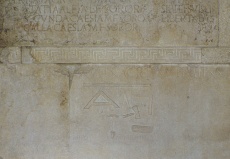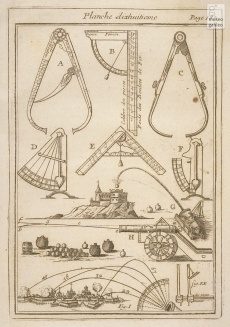Plumb Level
From Inventions
| Line 31: | Line 31: | ||
Image: 8528_3202_1692-012.jpg | Funerary monument of Lucius Alfius Statius (detail), on which are carved a Roman two-foot rule, an archipenzolo (plumb level), a compass, a square and a hammer. Aquileia, Museo Archeologico Nazionale.<br /> | Image: 8528_3202_1692-012.jpg | Funerary monument of Lucius Alfius Statius (detail), on which are carved a Roman two-foot rule, an archipenzolo (plumb level), a compass, a square and a hammer. Aquileia, Museo Archeologico Nazionale.<br /> | ||
| - | |||
Image: 8528_3202_1659-034.jpg | Nicolas Bion. ''Traité de la construction et des principaux usages des instruments de mathematique'', Paris, 1725, tav. 18.<br /> | Image: 8528_3202_1659-034.jpg | Nicolas Bion. ''Traité de la construction et des principaux usages des instruments de mathematique'', Paris, 1725, tav. 18.<br /> | ||
Revision as of 10:11, 26 July 2010
Also "archipenzolo". Name commonly used since the fifteenth century, as translation into the vernacular of the Latin "libella".
Description
Levelling instrument. Of ancient origin, this kind of square with plumb bob is one of the basic tools of masonry, used mainly to check brick-laying and verify horizontal planes. It was also widely used in hydraulic engineering, for levelling channels, and in the military field for aiming cannons.
Existing Instruments
Florence, Museo Galileo. Institute and Museum of the History of Science, inv. 3689.
Florence, Museo Galileo. Institute and Museum of the History of Science, inv. 670.
Florence, Museo Galileo. Institute and Museum of the History of Science, inv. 2531.
Florence, Museo Galileo. Institute and Museum of the History of Science, inv. 3184.
Florence, Museo Galileo. Institute and Museum of the History of Science, inv. 3690.
Florence, Museo Galileo. Institute and Museum of the History of Science, inv. 654.
Florence, Museo Galileo. Institute and Museum of the History of Science, inv. 702.
Florence, Museo Galileo. Institute and Museum of the History of Science, inv. 3604.
Florence, Museo Galileo. Institute and Museum of the History of Science, inv. 2539.
Images
Author of the entry: Filippo Camerota


